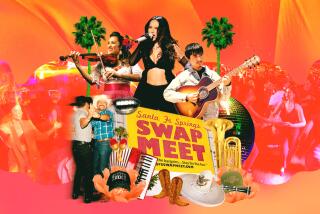Fiesta like the fool you are
IF SOMEONE asked you to attend a Mexican-themed party, what would you wear? Would you sport long hair, spiked bracelets and a tattered T-shirt of rock en español dinosaurs Caifanes? Maybe visit Brooks Brothers and mimic the sartorial splendor of Antonio Villaraigosa? A snug gown a la Salma Hayek for the mujeres? Jeans, surely?
No. You’re going to don a sombrero, glue on a fake mustache and act like a poor, despicable louse. You’ll probably belt out a couple of lusty arribas for good measure. And you’ll laugh. Really, what else could you do?
No one would recognize those other examples as Mexican, even though muchos Mexicans fit those descriptions. Not only that, but anyone who dresses up for an ethnic-themed fiesta wants to stand out, which means stereotypes: exaggerated takes on reality, some decades old, others as immediate as your office janitor. More important, cultural nuances at parties tend to disappear under a haze of bong hits.
It’s important to keep the above in mind when discussing the recent spate of mexcellente bashes held by our nation’s emerging scholars. The latest occurred in January, when students at Santa Clara University in Northern California were invited to a “South of the Border” party and attendees arrived as cholos, janitors and pregnant Latinas. The small campus — previously best known as the alma mater of NBA god Steve Nash — is in an uproar, and the national media have swooped in to cover the latest front in the immigration wars.
A college Mexican party — usually held under the auspices of the Greek system — is nowadays as much a part of university life as the Thought Police. A few recent examples:
Two years ago, Alpha Epsilon Pi’s USC chapter held a party titled “Once Upon a Time in Mexico,” at which attendees passed through barbed wire and curious Latino onlookers were told to — yep — go back to Mexico.
In 2003, a UC Irvine fraternity sponsored a “Drinko por Cinco” shindig in honor of the May 5 Mexican holiday and printed fliers that promised a “Dirty Sanchez Look-a-like Contest.”
In 1993, a UC Riverside fraternity advertised one of its gatherings with a poster showing a sleeping Mexican with sombrero and tequila bottle nearby.
And, for the sake of historical merriment, this: a 1968 Daily Bruin article described a frat party where members flew a fake Mexican flag adorned with a middle finger in place of the Mexican seal and a list of excluded guests, namely “no Negroes, no Japs, no Zapatas, no Zorros, no dogs.”
Each case was followed by the same ritual of hand-wringing: accusations of racism, rebutted with claims of ignorance or harmless fun, followed by protests and town hall meetings and an eventual half-hearted apology from the culprits. Peace was restored on campus — until the next opportunity to mock Mexicans.
So why do these incidents crack me up? Maybe it’s the power of history. Americans have enjoyed dressing like ethnics at bacchanals since the days of the Boston Tea Party. Blackface, togas, sweat lodges, Oktoberfest, St. Patrick’s Day, Tommy Bahama — the list goes on, even in this age of supposed racial acceptance.
Participating in such events seems to liberate otherwise placid souls from propriety and excuse momentary transgressions, all while lampooning the Other — a party mix more alluring than jungle juice.
No matter how many diversity workshops or school-sanctioned multicultural festivities universities may hold, these parties will continue. They’re as American as nachos.
What’s funniest about these controversies is the ridiculousness of the Speedy-Gonzales-for-a-day crowd. If trust-fund hotties think they can be as funny as Jack Black by dressing like my aunts, uncles and cousins, or by applying black lip-liner and calling themselves La Sad Eyes for a night, the joke is definitely on them, not us.
And for those of you offended by such tomfoolery: If someone is stupid enough to even attend an ethnically themed party, is browbeating really the cure? You’d be more effective just loading the culprits with tequila, then dropping them off in a barrio for a taste of the real deal.
Besides, spicy caricatures mesmerize more people than just drunken gabachos easily entranced by spicy caricatures. In his recently released “Tex[t] Mex: Seductive Hallucinations of the ‘Mexican’ in America,” San Diego State professor William Anthony Nericcio calls such images “digital crack.” Nericcio remembers how a 1950s-era New Yorker magazine illustration of a sleeping Mexican “still haunts me, as does the memory of laughing my ass off when I first saw it; here perhaps is born the idea of ‘Mexican’ hallucinations — ghosts realer than the real, who move us with their shadowy logic.”
Nericcio is on to something. Visit your favorite taqueria and I bet you pesos to dollars that the store’s logo probably features the same big-grinned, sombrero-wearing Mexican that caused so much grief at Santa Clara and other schools.
And few images during the 2006 World Cup were seemingly more startling than Mexican soccer fans wearing ponchos, drooping mustaches and sombreros as wide as satellite dishes. None of these Mexicans seemed offended — indeed, they were gleefully promoting the myth of the bandito. To laugh at others is human; to appropriate the laughter, divine.
More to Read
Sign up for Essential California
The most important California stories and recommendations in your inbox every morning.
You may occasionally receive promotional content from the Los Angeles Times.











